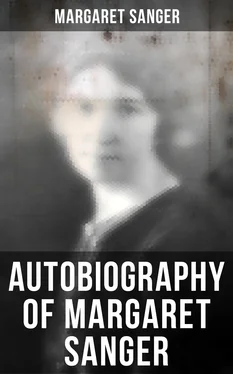I was also eager to encounter French people and discover their points of view. One of the first was Victor Dave, the last surviving leader of the French Commune of 1871. Thanksgiving Day we had a little dinner party and invited American friends to greet him. He was then over eighty, but still keen and active. As the evening wore on we started him talking about his past experiences and he held us enthralled until way into the morning, when we all had breakfast in the apartment.
The old Communard spoke English far better than any of us spoke French. He was now making three dollars a week by his linguistic abilities, because he was the sole person the Government could call upon not only for the language but the dialects of the Balkans. Just the day before he had been translating a new series of treaties which France was making with the Balkan States in a desperate attempt to tie them to the Triple Entente. Though he was a philosophical person who could be gay over his own hardships, his confidences to us were serious and sad. From the agreements then being drawn up, particularly those with Rumania, he could see nothing but war ahead, predicting definitely that within five years all nations would be at each other’s throats. We newcomers to Europe could not grasp the meaning of his words, and the residents shrugged their shoulders and said, “He is getting old. He cannot see that we are now beyond war, that people are too intelligent ever to resort to it again.”
As I look back it is apparent that we heard in France the whole rumblings of the World War. Unrest was in the air as it had been in the United States, but with a difference. Theaters were showing anti-German plays, revanche placards decorated Napoleon’s tomb in the Invalides, and the rusty black draperies around the shrouded statue of Strasbourg in the Place de la Concorde pointed a macabre note. These were remembered afterwards; at the time they were merely part of the Paris scene.
I realized the disadvantage of not being better acquainted with the French language, and started in to practice what I knew and learn more. Good fortune brought me in touch with an Englishwoman, the wife of the editor of L’Humanité, the organ of the Confédération Générale de Travail, the famous C.G.T. To her I clung and at her home I met the Socialist leader, Jean Jaurès. His English was bad and my French worse; we had to have an interpreter. Doubtless we missed a lot, but even so we found we understood each other. I believe that his assassination on the eve of the war which he had done so much to prevent proved an irreparable loss to the cause of peace.
In my language difficulties Jessie Ashley’s fluency was an ever-present help. Together we used to eat in the restaurants frequented by laborers, who came in groups, keeping their caps on, enjoying the cheap and good food accompanied by wine. Often we were the only women in the place, always excepting the inevitable cashier.
Though women were rarely seen at a C.G.T. meeting, Victor Dave took Jessie and me to a particularly impressive one which Bill Haywood was to address. His reputation as a firebrand had preceded him, and the police were making certain that no riot should ensue; they were stopping each person who crossed the bridge and demanding an account of his destination. Our passport was the venerable appearance of our escort, whose long white hair hung low about his head. His top hat, that universal badge of respectability, let us through.
The vast auditorium was filled with some three thousand French syndicalists, similar to the American I.W.W.’s, all standing, all wearing the uniform of the proletariat—black-visored caps and loose corduroys. They were being urged not to take up arms against the workers of other nations. I began to wonder whether perhaps the various tokens of disquiet which had impalpably surrounded me since coming to France had some more desperate meaning than we in America had realized. The War, What For? discussions in New York had seemed only a part of the evening conversations. Here again I was listening to protests against government efforts to arouse national hatred by calling it patriotism. I had heard the words so often, “Workers of the World, Unite,” yet at last I was vaguely uneasy because of the difference in spirit.
As we emerged into the narrow, alley-like street we found the exits into the boulevard guarded by hundreds of gendarmes, both mounted and afoot. Had any outbreak occurred, the assembled syndicalists would literally have been trapped.
My uneasiness was increased as a result of a visit to the Hindu nationalist, Shyamaji Krishnavarma. In England he had been an agitator for Indian Home Rule and, when the London residence of the Viceroy of India had been bombed, with other Indians who might have been implicated, he had fled to France, so long the sanctuary for anyone who, because of political beliefs, got into trouble elsewhere. Krishnavarma was now editing the Indian Sociologist, which was being secretly spirited across the Channel.
Krishnavarma had asked whether he might be permitted to give a reception in my honor. No Hindu had ever given a reception in my honor. Trying to appear, however, as though this were a frequent occurrence, I set a time and bravely entered his salon, supported, as usual, by Jessie.
About twenty-five men were there, Indian students all, and only one other woman, Mrs. Krishnavarma, barely out of purdah and still in native dress. As a great concession she had been allowed to come in, despite the presence of men. It was evident she could listen but not speak, because, when I asked her something about her children, Krishnavarma answered for her quickly. A little later I was disputing a point with him and, to bolster up his argument, he gave her a curt command in Hindustani. She rose swiftly and soon returned with a well-thumbed and pencil-marked copy of Spencer. I had come to consider Spencer’s philosophy old-fogyish. His teachings were so mild that I wondered what in the world he could ever have been hounded for. Though Krishnavarma was working towards the freedom of India he had gone no further than this pink tea which was not even pale China, let alone sturdy, black Ceylon.
I had been home scarcely more than half an hour and was dressing for dinner when Peggy ran in animatedly. “Mother, there are three soldiers at the door!” The bright uniforms of the gendarmes had taken her fancy, and she was pleased and excited. When I went out to meet them they demanded to know where we had come from, the object of our visit to France, how long we intended to stay, in what manner we had located the apartment, from whom we had rented it, where I had been that afternoon, the length of time I had known Krishnavarma, and the reason for my being at his home. Finally, they explained their presence by saying the concierge had not sent in the required information to the prefecture.
When I described the strange visitation to someone familiar with French customs, I was told that concierges were all ex officio agents of the police and were compelled to make regular reports of the activities, no matter how petty, of their tenants. These were incorporated into the dossiers of all foreigners. Actually, the police, working with the British Secret Service, were checking up on Krishnavarma’s callers. Thereafter gendarmes lingered in doorways outside our apartment, and wherever I went I was conscious they were in the vicinity.
Because of the predilection of the French for quality rather than quantity, they had not only adopted the sociological definition of proletariat, “the prolific ones,” a term originally applied by the Romans to the lowest class of society, but had interpreted it literally. The syndicalists in particular had made what they called conscious generation a part of their policy and principles, and had affiliated themselves with the Neo-Malthusian movement, which had its headquarters in London.
Читать дальше












